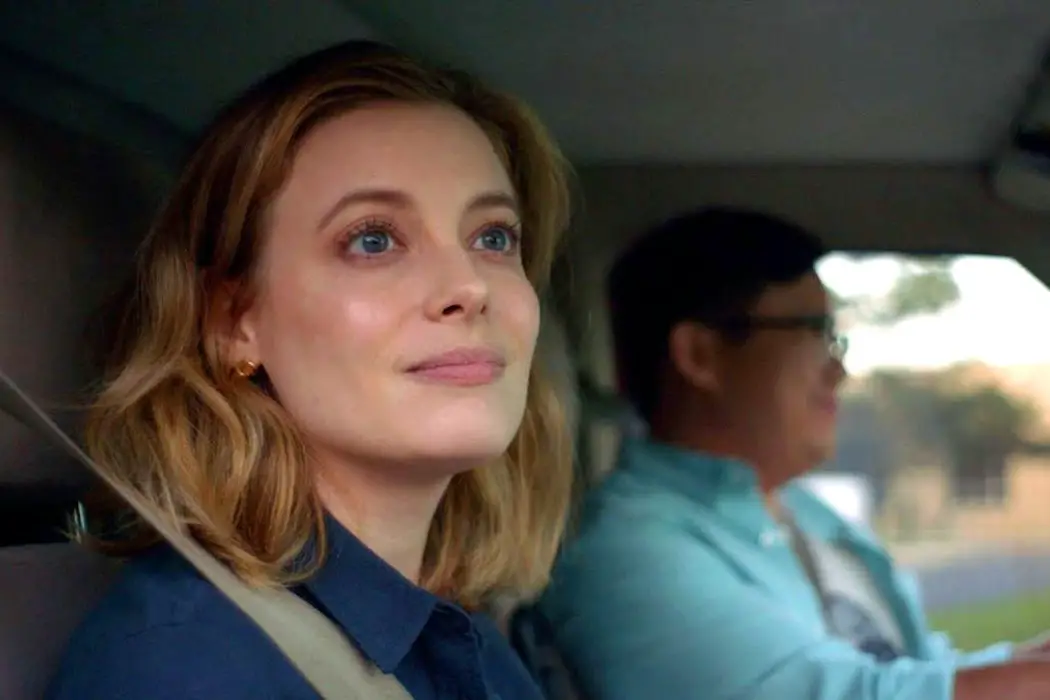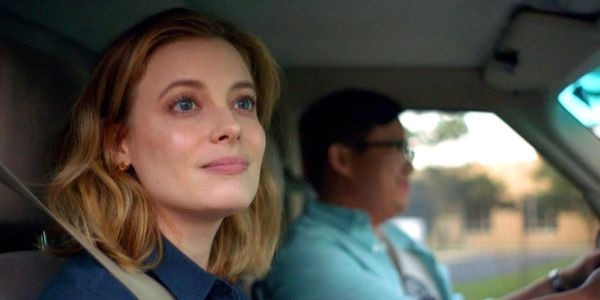I USED TO GO HERE: Anchored by a Winsome Gillian Jacobs

Tynan loves nagging all his friends to watch classic movies…
They’re words I’m sure most anyone who has ever pursued scholastic endeavors could attest to. Some swelling with pride, others admitting rather ruefully: I Used to Go Here. It’s always a phrase for the uninformed and the proverbially youthful. We were all there once upon a time, but as life has a habit of doing, it marches onward and we leave behind everything, whether high school heartbreaks or college exploits.
We can only look back at those seminal times in our lives from the present and any time we have the opportunity to go back, the strains of nostalgia start wafting over us even as we make peace with our present circumstances. Because, for many of us, we look at our jobs, we look at our relationship status, we look at our private insecurities, and they are far from what we aspired to in years prior.
It’s not a new concept by any means, but I Used to Go Here is another meditation on the mid-life malaise by way of our adolescent memories, when the world was our oyster, and we still had untarnished dreams. Kate Conklin (Gillian Jacobs) is an avatar for the folks muddling through life like you and me.
A Phone Call
The opening shot of Kris Rey‘s latest project is composed of a phone conversation taking place against your average, everyday urban intersection. A car nearly runs over a pedestrian. There’s a 7/11 on the corner and people bustling by the camera. If you’re like me – even if you know Jacobs already – you almost don’t notice her until she’s right in our faces.
It’s an effective illustration because in this opening conversation she finds out the book she recently wrote, in spite of the prospect of a New York Times review, is not doing as well as was hoped for. Her publishers have crunched the numbers and decided the book tour isn’t viable. They try and let her down easy, but it hurts. She always wanted to be a successful author. Now she feels like a failure.
I’ve seen these kinds of scenes before. It’s Zach Braff waiting tables at a restaurant he couldn’t care less about in The Garden State. It’s Josh Radnor getting his clothes swiped at the laundromat in Liberal Arts. They are all visual scenarios immediately humanizing our leads. This version might be the most natural, although poor Kate is also plagued by personal setbacks.

All her best friends from college are married and getting pregnant. It’s that stage in life. She was engaged once, but it fell through. Now she’s like a unicorn: A single woman in a sea of 30-something couples. However, how much is this the film playing inside of our own heads? Kate sits at a measured distance at a baby shower trying not to get in the way. She feels out of place even as her friends seem entirely genuine. They’re happy she’s there.
Then, there are the micro-observations. Take, for instance, the moment when the professor she used to worship welcomes her back to her alma mater. David Kirkpatrick (Jermaine Clement) calls Kate out of the blue, she needs the lifeline, so she accepts with a flutter in her heart, and then she finds out he has a wife. Expectations are dashed. It’s another sigh and private letdown, subsequently playing out in her mind.
With minor obligations, her return to Carbondale, Illinois is a fitting opportunity to relive the glory days. However, it’s hardly a triumphant victory tour. Like T.S. Eliot might say, she returns to her old stomping ground, “not with a bang, but with a whimper.” Oddly enough, she picks up the pieces by finding the way back to her old apartment.
The Writer’s Retreat
There’s a new generation of wide-eyed dreamers who live there. And while Kate’s existential crisis is imperative to our story, it’s these kids who make I Used to Go Here something singular and unique in its own right.
Again, there’s the perceived age gap – it’s obvious and if you’re overanalyzing the situation it’s a strange dynamic – but they accept Kate for who she is. For all their own shortcomings, this current generation, to their credit, is probably the most inclusive and accepting that I can think of. Although this often relativistic perspective doesn’t always make life easier.
Still, we meet guys like Animal and his girlfriend Emma – they have a relaxed clarity – and then the casually cool Hugo (Josh Wiggans) another Gen Zer who befriends Kate. You also have characters like Elliot (Rammel Chan), the perennial ray of sunshine, who chauffeurs Kate around, and the half-naked roommate known only as Tall Brandon (Brandon Daley). They especially feel like they could be stereotypes for the next generation of college movies. For now, they are fresh and individual with actors making the most of their screentime through a jovial approach to comedic situations.

If I’m to be honest, the story comes into its own when it breaks out of the patterns these types of movies usually find themselves beholden to – caught in a self-reflective reverie – simply rehashing the past instead of breaking new ground. The best thing about this new batch of friends is that they allow Kate to be in college again and what is college if it’s not setting off on scatterbrained adventures late at night?
Elliot becomes complicit in their midnight escapade to catch the beloved lit professor with his star pupil – the angsty yet fledgling author April (Hannah Marks) – a young protege who makes Kate feel even more insecure. Don’t try this at home kids… breaking into someone’s house uninvited is usually frowned upon. As a release valve of comedy, the story’s creative enough to have a subplot with Tall Brandon and Hugo’s estranged Mom; they share a lovely evening together watching Youtube videos with a fresh bowl of popcorn.
The Blind Leading The Blind
In a culture where most everyone’s lost and everyone is lonely, it’s reassuring for the older ones to look back at the younger, or vice versa, to see that they’re not all that different. Kate comes away from her weekend realizing just because a connection with a person doesn’t last forever, that doesn’t mean that it isn’t real. It does seem like everyone is seeking out realness or to put it another way, everyone is seeking out some kind of truth and comfort they can grab hold of.
One of the symptoms of this is the hook-up culture and why everyone is looking to shack up with everyone else. It’s the source of much of the film’s humor, but also its greatest heartbreaks. It’s also a bit like the blind leading the blind. We’re so quick to let other people down in our relationships and we’re all implicated.
There’s a pertinent quote from an esteemed TV show of mine where the narrator posits, “All of our young lives we search for someone to love. Someone that makes us complete. We choose partners and change partners. We dance to a song of heartbreak and hope. All the while wondering if somewhere, somehow, there’s someone perfect who might be searching for us.” If it’s true for most people, then it couldn’t be more fitting for the characters in this movie.
Conclusion: I Used to Go Here
Eventually, the inevitable comes, her fateful getaway is winding down, and Kate rushes off to perform her obligatory duties as moral support for her best friend, who is about to go into labor. She’s ripped out of yet another disappointment back into the turbulence of life. Her final conversation with Elliot is a bit like a rainbow after another storm.
While she admits life could be better – nothing’s been entirely resolved – she reasserts herself as a friend and clears the air with Amy (not to mention her B & B landlady). They are small victories that nevertheless signify something. What it provides is not a total reversal but an acknowledgment that things could be better, and they will be better, eventually. This is the operative word.

This may sound needlessly dismissive, but I Used to Go Here is about far more than one could have hoped and imagined with a pleasant amount of consideration given to all its characters. Far from being a pair of names, Jacobs does a fine job staying the course of the movie and Clement brings his awkward brand of charm into a role that could have easily pigeonholed him as either a caricature or a villain. Instead, he comes prepared with chamomile tea.
To be frank, there are probably far too many of these movies and most are mediocre, but I Used to Go Here does itself some favors by allowing Jacobs to breathe and actually be a person surrounded by a host of worthwhile acquaintances. Sans a couple of token cameos from Kate Micucci and Jorma Taccone, most of the characters feel like far more than walking punchlines. We quickly grow to care for them and to laugh with them. This is to Rey’s credit and a testament to her cast for bringing everyone to life.
Are there too many of these types of young adult existential crisis movies? What sets the good ones apart? Let us know in the comments below!
I Used To Go Here will be released VOD on August 7, 2020!
Watch I Used To Go Here
Does content like this matter to you?
Become a Member and support film journalism. Unlock access to all of Film Inquiry`s great articles. Join a community of like-minded readers who are passionate about cinema - get access to our private members Network, give back to independent filmmakers, and more.
Tynan loves nagging all his friends to watch classic movies with him. Follow his frequent musings at Film Inquiry and on his blog 4 Star Films. Soli Deo Gloria.












